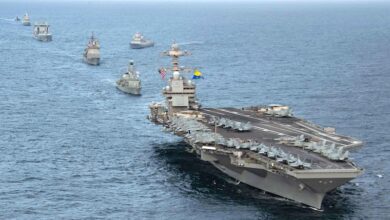Did the U.N. know about a terrorist tunnel being dug into Israel right under the feet of U.N. peacekeepers?
Israel’s discovery this week of the sophisticated tunnel dug by Hezbollah to breach the Lebanon-Israel border has put the U.N. in an awkward position. Known for passing hundreds of resolutions that condemn Israel, including just existing, the U.N. is reacting oddly, with no condemnation for the terrorist group.
UNIFIL’s mandate includes helping Lebanon’s army to secure the border and ensuring that southern Lebanon is not used for hostile activities by non-state actors. Hezbollah’s very existence as an armed militia violates two U.N. Security Council resolutions.
But in a carefully-worded statement responding to Israel’s announcement that it is searching for and destroying under-border tunnels, UNIFIL did not address the substance of the claims, or mention Hezbollah at all.
“UNIFIL is working with all interlocutors in order to maintain the overall stability,” it said, adding that peacekeepers have increased patrols, together with the Lebanese Armed Forces (LAF), “to maintain the overall stability and avoid misunderstandings that could lead to any escalation.”
In New York, a spokesman for U.N. Secretary-General Antonio Guterres read out the UNIFIL statement at a press briefing, but he too did not mention Hezbollah.
Critics of the U.N. mission, which was established four decades ago as an “interim” operation, have long argued that the Iranian-sponsored Hezbollah is preparing for another war against Israel under the peacekeepers’ noses.
The Israeli Defense Forces (IDF) said Tuesday it had launched an operation to destroy attack tunnels dug under its northern border, saying it had discovered one which began in a home in a Lebanese village and extended about 130 feet into Israel.
The IDF said the tunnel was six feet wide and six feet high, and boasted ventilation systems, electricity and communication infrastructure.
‘A double war crime’
In a televised address on Tuesday night, Prime Minister Binyamin Netanyahu said it was “built with one purpose in mind – to attack and murder innocent Israeli men, women and children.”
Noting the tunnel’s proximity to a home, Netanyahu called that “just one more example of how Hezbollah is committing a double war crime. They target civilians while hiding behind civilians.”
Netanyahu called the tunnel construction “a gross violation of U.N. Security Council Resolution 1701.”
That 2006 resolution, which ended a month-long war between Israel and Hezbollah, demanded “the disarmament of all armed groups in Lebanon, so that … there will be no weapons or authority in Lebanon other than that of the Lebanese state.”
The conflict erupted after Hezbollah crossed the border and abducted two Israeli soldiers who were later killed.
Under resolution 1701 and an earlier one, resolution 1559 of 2004, the LAF is meant to be the only legitimate armed entity in Lebanon, apart from UNIFIL peacekeepers.
Since the 2006 war, however, Hezbollah has tightened its grip on the area and rearmed with the help of Iran and the Assad regime. According to Israel it has built up an arsenal of 130,000 rockets.
The Trump administration threw its support behind Israel’s anti-tunnel operation. National Security Advisor John Bolton said the U.S. “strongly supports Israel’s efforts to defend its sovereignty,” and called on Hezbollah to “stop its tunneling into Israel and to refrain from escalation and violence.”
Hezbollah did not immediately comment publicly on the IDF operation, but its al-Manar television station reported that, “The Zionist enemy announced it launched an operation to cut off alleged Hezbollah infiltration tunnels to Palestinian occupied territories.”
When UNIFIL’s mandate came up for a renewal last year, U.S. Ambassador to the U.N. Nikki Haley led a push to bolster it, strengthening the peacekeepers’ ability to prevent the spread of weapons in southern Lebanon, and “increase its capacity and commitment” to investigate and report on violations.
The renewal resolution did not mention Hezbollah by name.
But it did call for “full implementation of resolution 1701,” reiterated that UNIFIL is authorized to take all necessary action “to ensure that its area of operations is not utilized for hostile activities of any kind,” and called on Guterres to “look at ways to increase UNIFIL’s visible presence, including through patrols and inspections”
Guterres’ most recent report to the Security Council on UNIFIL activities, issued last month, included references to “allegations of arms transfers to non-state armed actors.”
“While taking such allegations seriously, the United Nations is not in a position to substantiate them independently,” it said. “Were the allegations to be proved correct, they would constitute a violation of resolution 1701.”
UNIFIL comprises some 10,520 military personnel from 41 countries, as well as just over 800 international and Lebanese civilian staff. Its budget for the 2018-2019 period is $474.4 million.
In its budget proposal for fiscal year 2019, the State Department requested $84.24 million for UNIFIL, a significant drop from the FY 2017 figure of $146.1 million.








